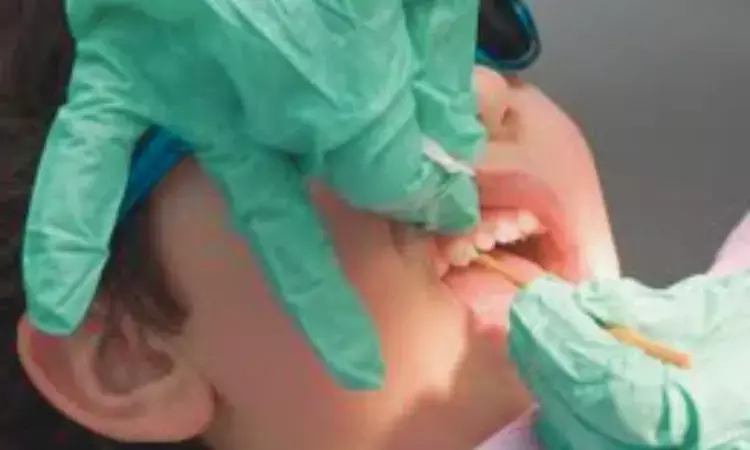- Home
- Medical news & Guidelines
- Anesthesiology
- Cardiology and CTVS
- Critical Care
- Dentistry
- Dermatology
- Diabetes and Endocrinology
- ENT
- Gastroenterology
- Medicine
- Nephrology
- Neurology
- Obstretics-Gynaecology
- Oncology
- Ophthalmology
- Orthopaedics
- Pediatrics-Neonatology
- Psychiatry
- Pulmonology
- Radiology
- Surgery
- Urology
- Laboratory Medicine
- Diet
- Nursing
- Paramedical
- Physiotherapy
- Health news
- Fact Check
- Bone Health Fact Check
- Brain Health Fact Check
- Cancer Related Fact Check
- Child Care Fact Check
- Dental and oral health fact check
- Diabetes and metabolic health fact check
- Diet and Nutrition Fact Check
- Eye and ENT Care Fact Check
- Fitness fact check
- Gut health fact check
- Heart health fact check
- Kidney health fact check
- Medical education fact check
- Men's health fact check
- Respiratory fact check
- Skin and hair care fact check
- Vaccine and Immunization fact check
- Women's health fact check
- AYUSH
- State News
- Andaman and Nicobar Islands
- Andhra Pradesh
- Arunachal Pradesh
- Assam
- Bihar
- Chandigarh
- Chattisgarh
- Dadra and Nagar Haveli
- Daman and Diu
- Delhi
- Goa
- Gujarat
- Haryana
- Himachal Pradesh
- Jammu & Kashmir
- Jharkhand
- Karnataka
- Kerala
- Ladakh
- Lakshadweep
- Madhya Pradesh
- Maharashtra
- Manipur
- Meghalaya
- Mizoram
- Nagaland
- Odisha
- Puducherry
- Punjab
- Rajasthan
- Sikkim
- Tamil Nadu
- Telangana
- Tripura
- Uttar Pradesh
- Uttrakhand
- West Bengal
- Medical Education
- Industry
Sensors Could Revolutionize Stress Detection in Young Dental Patients During Treatments: Study

Sweden: A pilot study published in the European Archives of Paediatric Dentistry has illuminated the potential of sensors to detect stress in young patients undergoing dental treatments, offering insights into their responses to invasive versus non-invasive procedures. The findings pave the way for innovative approaches to managing dental anxiety and improving patient care.
The study utilized the Shimmer3 GSR+ device, a commercially available, CE-marked sensor, to monitor a patient's galvanic skin response (GSR). It found that the invasive dental procedure triggered a consistent GSR pattern across patients, while the non-invasive treatment showed varied GSR responses among individuals. The Shimmer3 GSR+ device effectively identified stress responses caused by the invasive anesthetic procedure.
A reliable tool is needed to detect early signs of stress in children to prevent the development of dental fear. To address this, L. Krekmanova, Institute of Odontology, Sahlgrenska Academy, University of Gothenburg, Gothenburg, Sweden, and colleagues evaluated the Shimmer3 GSR+ device, a CE-marked sensor, to determine its ability to monitor stress responses related to fear or pain during non-invasive and invasive dental treatments.
For this purpose, the researchers invited 14–16-year-old patients to participate in either a non-invasive oral check-up (NI) or an invasive orthodontic premolar extraction (I). Stress responses were monitored using the Shimmer3 GSR+ device, with electrodes and an optical pulse probe placed on the wrist and fingers. The device transmitted data via Bluetooth to an HP laptop, recording heart rate through photoplethysmography (PPG), galvanic skin response (GSR), and 3-axis gyroscope and accelerometer signals to track hand movements. Additionally, patients completed self-report measures, including the colored analogue scale for pain intensity, the facial analogue scale for mood, and a dental fear scale. Descriptive statistics were used to analyze the data.
The investigation revealed the following findings:
- The NI group included 20 patients (14.6 ± 0.5 years) who underwent 20 oral check-ups.
- The I group included 14 patients (15.3 ± 0.5 years) who underwent 28 premolar extractions.
- All patients tolerated the Shimmer3 GSR+ unit well during the procedures.
- In the I group, GSR signals increased significantly at the start and during the oral injection, with amplitudes persisting throughout and after the dental injection.
- The NI group showed no general uniform pattern or high GSR amplitudes during the oral check-ups.
Considering the study's limitations, the authors concluded that the invasive dental procedure resulted in a consistent, unified GSR pattern, while the non-invasive procedure showed varied, individual GSR responses. They highlighted that the commercially available, CE-marked Shimmer3 GSR+ device effectively detected stress responses triggered by the invasive anesthetic procedure.
"Future interdisciplinary research is crucial to identify the best strategies for preventing acute procedural pain in young dental patients. The Shimmer3 GSR+ unit or similar wearable sensor devices could offer a promising solution," the researchers concluded.
Reference:
Jaldin, C., Jonasson, C., Fagrell, T. et al. Sensors: future tools for detecting young patient’s stress during a dental invasive versus a non-invasive dental treatment—a pilot study. Eur Arch Paediatr Dent (2024). https://doi.org/10.1007/s40368-024-00967-7
Dr Kamal Kant Kohli-MBBS, DTCD- a chest specialist with more than 30 years of practice and a flair for writing clinical articles, Dr Kamal Kant Kohli joined Medical Dialogues as a Chief Editor of Medical News. Besides writing articles, as an editor, he proofreads and verifies all the medical content published on Medical Dialogues including those coming from journals, studies,medical conferences,guidelines etc. Email: drkohli@medicaldialogues.in. Contact no. 011-43720751


